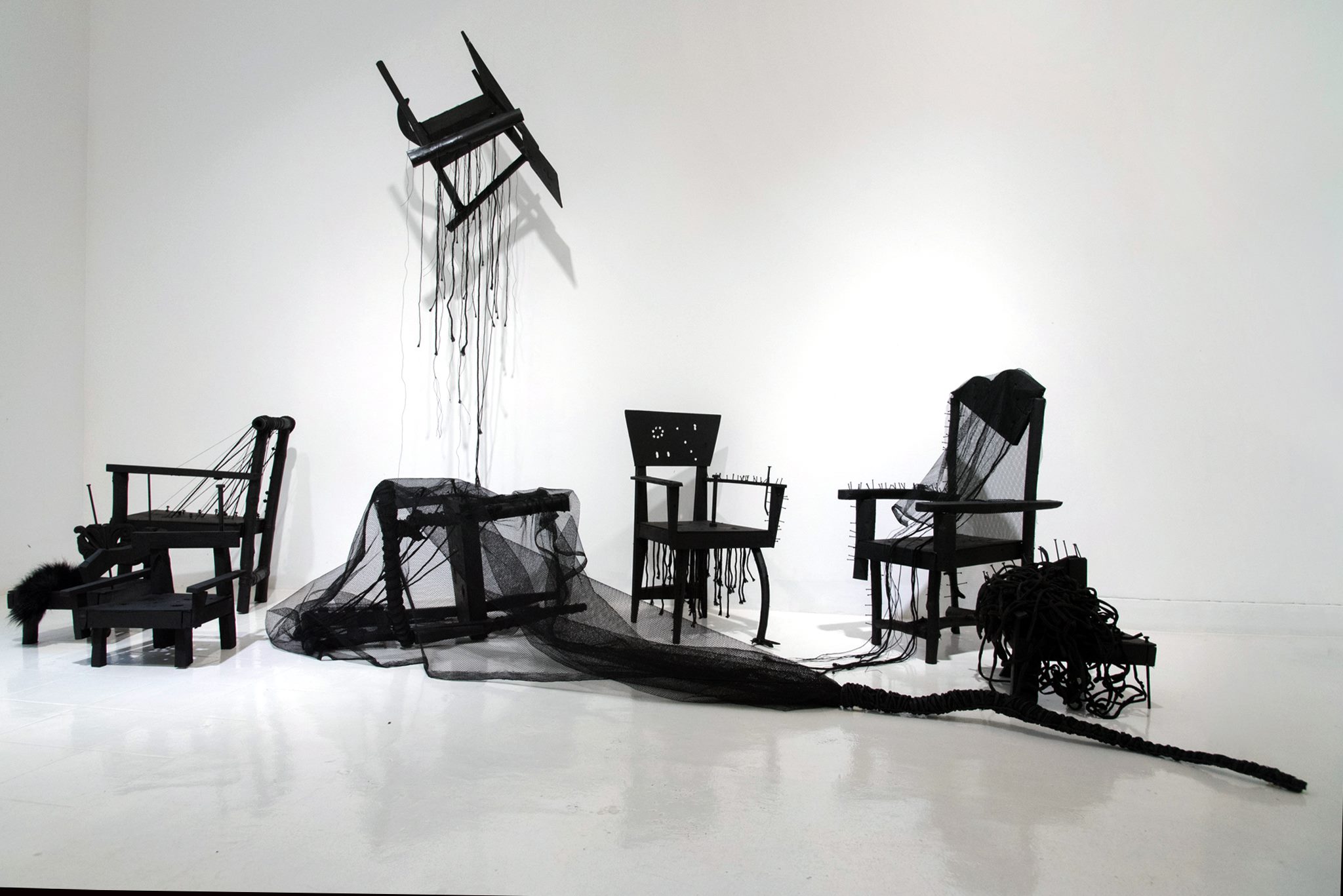Image: Disappearances by S.P. Pushpakanthan.
(10 April 2019, London) The statements made by the Sri Lankan delegates at the UN Human Rights Council (UNHRC) 40th session and again within a week after returning from Geneva are highly disappointing. The Global Tamil Forum (GTF) finds this disconcerting, considering Sri Lanka has just taken the positive step of co-sponsoring the HRC Resolution 40/1. The statements dealing exclusively with macho nationalism and inviolable sovereignty; constitutional scapegoats; and even misrepresentation about private meetings with high-ranking OHCHR officials were clearly aimed at pacifying the Sinhala hard-line elements. The merits of the UNHRC processes, the disappointments expressed by most countries regarding the pace of progress, and the failure to date to make real impact on individual victims and their families did not deserve any mention.
The core of the argument presented by Foreign Minister Marapana at the Human Rights Council centred on the Supreme Court resolving the constitutional crisis late last year and how that is giving credence to the independence of Sri Lanka’s judiciary. The peaceful resolution of that crisis is welcome, and it indicates improvement from previous years in the objectivity of the Supreme Court when it concerns constitutional matters. However, the Sri Lankan judiciary and other key institutions administering justice on serious crimes committed during the war, perhaps with the connivance of some who were associated with the government, is altogether a different proposition.
Speaking in the Sri Lankan Parliament after the passing of the Resolution 40/1, the Foreign Minister again ruled out the possibility for foreign judges, saying “Without legislation, we cannot have foreign judges sitting in our judicial system deciding the capability of our citizens. Even if we bring in such legislation, the Supreme Court will strike it down.” While his constitutional interpretation has been questioned by many, the Minister was oblivious to the fact that Sri Lanka co-sponsored the UNHRC resolutions three times, and the resolutions unambiguously specified the importance of including “Commonwealth and other foreign judges” in a Sri Lankan judicial mechanism, not as mere observers or advisers, but in full judicial capacity.
Not a single family affected by enforced disappearance has been able to ascertain the truth
It is an undisputable fact that ten years after the end of the war, not a single family affected by enforced disappearance has been able to ascertain the truth, or received justice or reparation, and no one has been punished for the war crimes committed. Even in the emblematic cases such as – the killings of 5 students in Trincomalee; the massacre of 17 aid workers in Muttur (both in 2006); and the murder of the high-profile journalist Lasantha Wickrematunge (2009) – there has been no judicial outcome more than a decade after. If the past is of any indication, there is not a single case or outcome to support the independence and impartiality of the judiciary when serious cases of human rights violations are heard – particularly when the perpetrators are security forces and those linked to the establishment, and the victims are Tamils.
There is no doubt among the victimised Tamil community and the human rights bodies that Sri Lanka lacks the capacity will and laws to criminalise atrocity crimes and provide witness protection. Hence credible international participation is vital in any worthy judicial process. Insisting continuously on a purely domestic court and judges will only lead to increased calls for an international judicial mechanism to address criminal accountability.
High Commissioner Bachelet was right
High Commissioner Bachelet was accurate when she addressed the Human Rights Council, stating “Sri Lanka’s process of implementing human rights reforms has been delayed due to the lack of common vision among the country’s highest leadership.” The deplorable statements by Sri Lankan officials during and after the UNHRC sessions are consistent with this lack of vision and leadership that is symptomatic of Sri Lanka’s troubled transitional justice process.
There never was a serious attempt to incorporate in the national dialogue the importance of accountability, the need to end impunity and the urgency of constitutional reforms to achieve genuine reconciliation, peace and prosperity benefiting all communities. A comprehensive plan to implement all aspects of the UNHRC resolutions in a timely and synchronised manner was never developed. Instead, it was always an ad hoc politicised process to keep the international community at bay, while no serious step was taken fearing it would result in political fallouts. At times it even appeared that imaginary opposition by extremist elements was used as cover to mask lack of political will. Justice for the victims and their families was never a serious concern.
The access to truth and justice should no longer be denied to the victims
Almost a decade has passed since the war ended and it is unconscionable to let the victims remain in limbo and suffer. The access to truth and justice – a basic universal human right – should no longer be denied to the victims, irrespective of their origins and backgrounds. Rather, a victim-centric approach and an action plan arrived in coordination with the OHCHR, along with full utilisation of Technical Assistance provided by UNHRC and other UN agencies is vital, to regain the momentum to prevent failure of the transitional justice agenda.
GTF fully concurs with High Commissioner Bachelet’s call that “the Sri Lankan Government should now refocus its efforts on fulfilling its obligation to provide justice and accountability and honour its commitments to establish the truth about what happened and to promote reconciliation,” and would like to reaffirm its commitment to assist such a process that will lead to true accountability, political resolution and closure to the emotional sufferings of the surviving victims. Only such measures will guarantee non-recurrence of conflict and foster durable peace for all peoples of Sri Lanka.
PRESS STATEMENT / 10 April 2019, London
